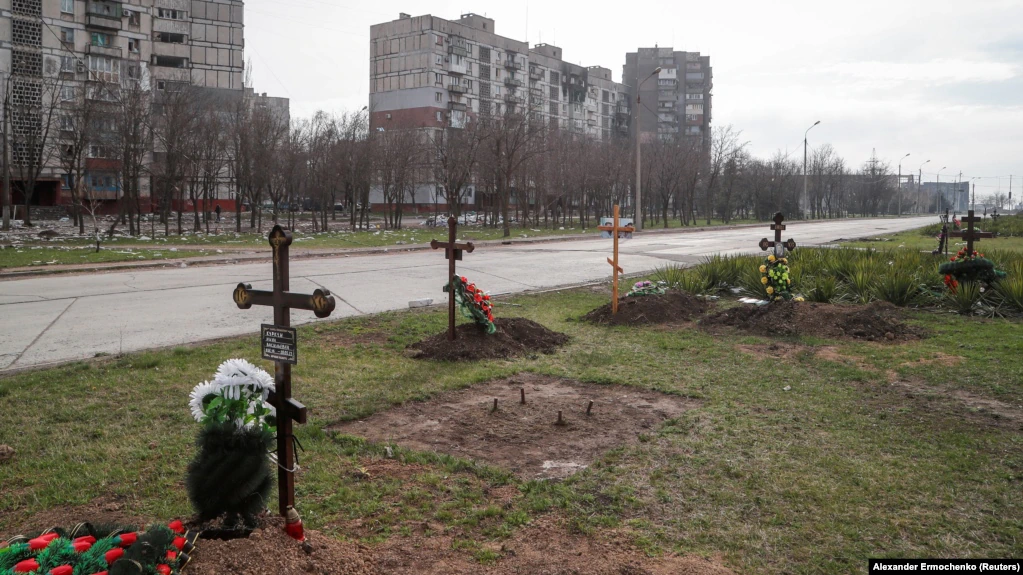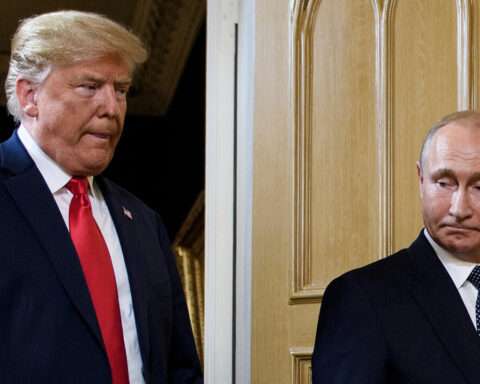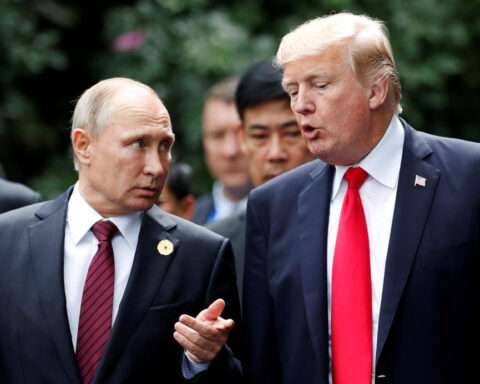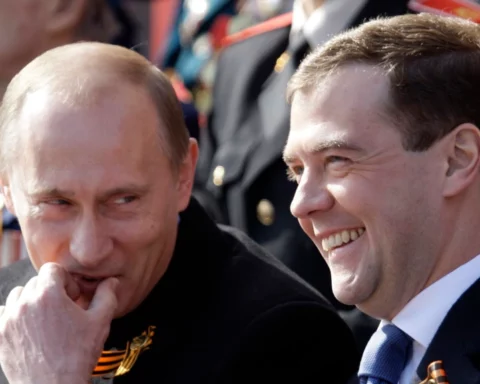President Vladimir Putin vowed to press on with the Russian military campaign, now shifting focus to eastern Ukraine, as international experts voiced concern about reports of possible chemical weapons use in the besieged port of Mariupol.
With convoys of Russian equipment moving in multiple directions toward the eastern Donbas region, U.S. President Joe Biden for the first time characterized the Russian war as “genocide,” though he later appeared to backtrack slightly, signaling it was not a formal U.S. government finding.
In his nightly address on April 12, Ukrainian President Volodymyr Zelenskiy highlighted the unconfirmed reports that a chemical weapon had been used in Mariupol, where Ukrainian marines and Azov Battalion soldiers have waged a stubborn defense amid weeks of brutal, street-to-street fighting.
Zelenskiy said that while experts try to determine what the substance might be, “The world must react now.”
Hanna Malyar, Ukraine’s deputy defense minister, said it was possible that phosphorus weapons — which are not classified as chemical weapons — had been used in Mariupol.
The Organization for the Prohibition of Chemical Weapons said it was closely monitoring the situation in Ukraine.
With conditions in Mariupol appearing grim, Ramzan Kadyrov, the Chechen strongman whose soldiers have been at the vanguard of the Russian assault on Mariupol, said on April 13 that more than 1,000 Ukrainian marines had surrendered in Mariupol.
Russian state TV showed images of what it said were Ukrainian troops giving themselves up at a steel factory in Mariupol, many of them injured.
There was no independent confirmation of a mass surrender, however. Ukrainian military commanders said on April 13 that Russian attacks in the city were proceeding.
Poland’s president, and the leaders of the three Baltic nations, were headed to Kyiv on April 13 in a trip to bolster Zelenskiy’s government. They are the latest in a growing number of European leaders who have trekked to Ukraine in a show of support.
Speaking on April 12 alongside Belarusian leader Alyaksandr Lukashenka, Putin asserted that Russia “had no other choice” than to invade on February 24, saying the campaign was aimed to protect people in parts of eastern Ukraine and to “ensure Russia’s own security.”
He pledged it would “continue until its full completion and the fulfillment of the goals that have been set.”
In the United States, Biden on April 12 characterized Russia’s war as “genocide” and accused Putin of trying to “wipe out the idea” of being Ukrainian.
Pressed later by reporters, he clarified the comment, saying he called it genocide “because it has become clearer and clearer that Putin is just trying to wipe out the idea of being able to be Ukrainian and the evidence is mounting.”
He added that lawyers can decide whether it qualifies as genocide, “but it sure seems that way to me.”
Russian forces were thwarted in the first phase of the war, failing to take Kyiv or other major Ukrainian cities, amid fierce defense from the Ukrainians, who have been increasingly well-armed with Western weaponry.
Russian military commanders are now shifting forces and gearing up for a new offensive in the Donbas region, where war has been ongoing since 2014. The region borders Russia, meaning it will be easier to supply and replenish troops.

Ukraine’s Deputy Prime Minister Iryna Vereshchuk said no humanitarian corridors for the evacuation of civilians trapped by fighting between Russian and Ukrainian troops would be opened on April 13.
Vereshchuk said in a statement on her Telegram channel that the situation was too dangerous to open the escape routes because Russian troops were not adhering to terms of agreements reached to allow the evacuations.
“In the Zaporizhzhya region, the [Russians] blocked evacuation buses, and in the Luhansk region, they are violating the cease-fire,” she said.
They “not only disregard the norms of international humanitarian law, but also cannot properly control their people on the ground. All of this creates such a level of danger on the routes that we are forced to refrain from opening humanitarian corridors today,” she added.
There was no immediate comment from Russia on the situation.
In Washington, a senior U.S. defense official said the Biden administration was preparing yet another package of military aid, possibly totaling up to $750 million.
U.S. media reported that the Pentagon was also set to convene a meeting of leading U.S. arms manufacturers on April 13, to discuss way to speed up the production of existing weapons and develop new one to help Ukraine.
Among the U.S. and NATO weapons that experts say have greatly helped the Ukrainians are Javelin anti-tank missiles, Stinger antiaircraft missiles, and drones, including new so-called “kamikaze” Switchblade drones. Ukrainian forces have also received ammunition, flak jackets, night-vision goggles, first-aid kits, and other equipment.
In his nightly speech, Zelenskiy said evidence of “inhuman cruelty” toward women and children in Bucha and other suburbs of Kyiv continued to surface, including alleged rapes.






